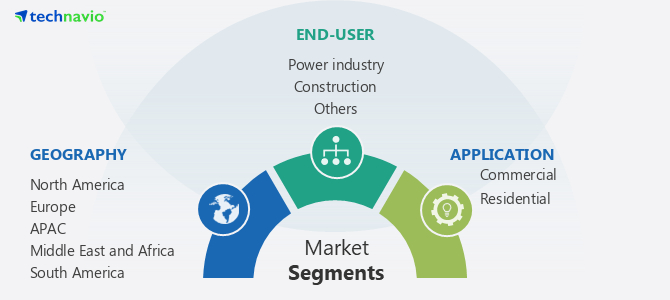Energy Management Software Market to grow by US$ 17416.7 million between 2024 and 2029, driven by cost reduction advantages- Technavio
- Technavio, a leading global technology research and advisory company, today announced the publication of its latest market report, "energy management software market." The report forecasts the market to grow by by US$ 17416.7 million during the period 2024 –2029, exhibiting a compounded annual growth rate (CAGR) of 11.4%.
- The global energy management software market is witnessing a notable shift towards cloud-based solutions. Cloud-based energy management systems enable users to access the application through web-browser interfaces, granting administrative control over access levels across the organization. Concurrently, users can log in to the system from any Internet-enabled device, including mobile devices, which often come with dedicated apps for enhanced usability. A key advantage of cloud-based energy management software is its scalability, allowing for seamless expansion as capacity requirements grow.
Get more information on energy management software market by Requesting a Sample Report

Key Market Insights
Our comprehensive analysis reveals several key findings from the report:
- YoY growth 2024-2025(%): The market is projected to grow by 9.9% during the forecast period.
- Key Growth Drivers: Cost reduction advantages, Growing demand for mobile technology, Inclination toward building automation. Together, these drivers will shape the future trajectory of the market over the forecast period.
- Major Market Challenges: While drivers will fuel market expansion, Rising number of open-source platforms for energy management software, Energy data security-related concerns, Increase in process complexity are expected to moderate the pace of growth.

Market Segmentation
The report segments the energy management software market by:
-
End-user
- Power industry
- Construction
- Others
-
Application
-
Component
-
Geography
- North America
- Europe
- France
- Germany
- Italy
- Spain
- UK
- APAC
- Middle East and Africa
- South America

Competitive Landscape
The market is characterized by intense competition with several key players. The report provides a detailed analysis of the competitive landscape, highlighting key strategies and market positions of leading vendors, including
- ABB Ltd.
- Accruent
- Autodesk Inc.
- Benchmark Digital Partners LLC
- Broadcom Inc.
- C3.ai Inc.
- Eaton Corp. plc
- Emerson Electric Co.
- EnergyCAP LLC
- ENGIE SA
- Envizi
- General Electric Co.
- Honeywell International Inc.
- International Business Machines Corp.
- Itron Inc.
- MRI Software LLC
- SAP SE
- Schneider Electric SE
- Siemens AG
- Wolters Kluwer NV
Quote from an Analyst
“Adoption of cloud-based energy management software signals strong growth opportunities ahead.” said Senior Analyst at Technavio. This trend is not only creating new opportunities but also reshaping the competitive landscape. Our report provides the strategic insights needed to navigate this dynamic market.
Explore detailed insights and data-backed forecasts by Accessing the FREE PDF Report
Research Analysis Overview
- The energy management software market encompasses solutions that facilitate grid modernization through smart grid technologies. It caters to energy efficiency standards in buildings, certified green, and industrial automation. Data center optimization, campus management, and facility management are key areas, along with portfolio management. Geospatial data analysis, preventative maintenance, and capacity planning are essential functions. Energy accounting, lifecycle cost analysis, procurement, trading, risk management, and contract negotiation are integral parts. Security, including cloud security, data integrity, data governance, data archiving, system integration, project management, and implementation services, are critical components.
- Additionally, it offers data migration, system upgrades, change management, process automation, workflow automation, mobile applications, UI/UX design, security audits, penetration testing, vulnerability assessments, business continuity planning, and disaster recovery planning.
Market Research Overview
- The energy management software market is a segment of the broader IT application software industry, focusing on energy consumption monitoring, demand response optimization, predictive analytics, real-time data acquisition, smart meter integration, renewable energy integration, and microgrid management. This market caters to businesses and organizations seeking to optimize energy usage and costs, improve operational efficiency, and enhance sustainability.
- Technavio's market analysis covers companies that develop and produce specialized software for this purpose, contributing to the global application software market, which encompasses enterprise, technical, and cloud-based software, excluding interactive home entertainment and systems or database management software.. Industries are leveraging the products belonging to the market for customer engagement, transactional notifications, and promotional offers.
About Technavio
Technavio is a leading global technology research and advisory company. Their research and analysis focus on emerging market trends and provide actionable insights to help businesses identify market opportunities and develop effective strategies to optimize their market positions.
Contacts
Technavio Research
Jesse Maida
Media & Marketing Executive
US: +1 844 364 1100
UK: +44 203 893 3200
Email: media@technavio.com
Website: www.technavio.com/